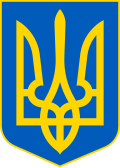 |
|---|
| ||
|---|---|---|
2nd Prime Minister of Ukraine (government) 2nd President of Ukraine First term (1994–1999)
Second term (1999–2004)
Post-presidency Controversies and protests
Governments Elections Media gallery | ||
A four-part constitutional referendum was held in Ukraine on 16 April 2000. [1] The referendum was called by President Leonid Kuchma, [2] and asked voters whether they approved of four amendments to the constitution that would increase the powers of the President and introduce an upper chamber. [2]
Contents
Although all four were approved by wide margins, [3] the changes were never implemented by the Verkhovna Rada on the basis that the referendum was unconstitutional, as it had not passed the proposals before they went to a referendum. [2] The Venice Commission that reviewed the case confirmed the questionable nature of the referendum that should be reviewed by the Constitutional Court of Ukraine.
As of 2025, this was the most recent referendum in Ukraine.


